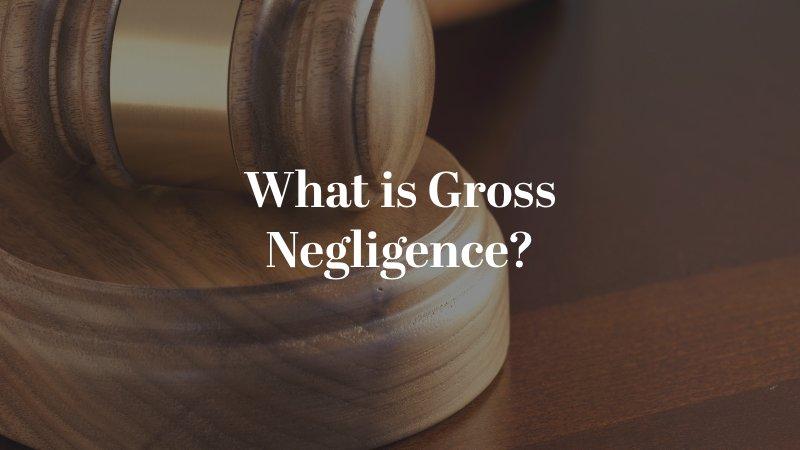If you were injured in an accident that was somebody else’s fault, you may hear the term negligence. Most personal injury cases are based on this legal concept. However, some cases go a step further and involve the defendant’s gross negligence. An experienced injury attorney can explain the definition of negligence and gross negligence and how this may impact your personal injury claim.

What Is Ordinary Negligence?
Most personal injury cases are based on the concept of negligence, which is the failure to act in a certain way that causes injury to another. There are four legal elements of negligence:
- Duty of care: The defendant has a legal duty to act in a certain way or refrain from acting in a certain way.
- Breach of duty: The defendant does something that violates their duty of care.
- Causation: The defendant’s breach of duty is the direct and legal cause of your injuries.
- Damages: You suffered losses that a court can compensate you for because of the accident.
Negligence is a form of carelessness. It does not typically involve intentional actions. It can cause accidents, but someone is still responsible for the resulting injuries.
Motor vehicle accidents often occur due to negligence. Examples of negligent acts that can cause car accidents include:
- Texting while driving
- Not checking mirrors before changing lanes
- Failing to yield another vehicle’s right-of-way
- Crossing the street as a pedestrian when there is no walk sign
Negligence can also apply to other types of personal injury cases, such as premises liability, slip-and-fall, and dog bite cases.
What Is Gross Negligence?
Colorado’s case law defines gross negligence as “the intentional failure to perform a manifest duty in reckless disregard of the consequences as affecting the life or property of another.” This means that the defendant blatantly acts dangerously without consideration for the high probability that their actions can harm others or damage property. These situations sometimes involve intentional behavior.
Examples of gross negligence may include:
- Knowingly running through a red light at an intersection
- Committing acts of road rage
- Drinking and driving
These cases often involve showing the defendant’s state of mind and can be more challenging to prove.
What is the Burden of Proof in a Gross Negligence Case?
The plaintiff must demonstrate by a preponderance of the evidence—meaning it is more likely than not—that the defendant is liable for gross negligence.
How Does Gross Negligence Affect a Personal Injury Claim?
The main way gross negligence can affect personal injury claims is in the amount of damages the court awards. In cases involving gross negligence, the defendant may be ordered to pay more damages because they willingly put others’ health and safety at risk.
Additionally, courts may award punitive damages in cases where the defendant’s actions are particularly reckless, as a way to punish the wrongdoer. However, you will need clear and convincing evidence to establish your right to these damages.
Damage Caps
Damages are often capped by law. For instance, in Colorado:
- Medical malpractice: $300,000 for non-economic damages, $1,000,000 total.
- Non-economic loss or injury: $613,760, increasing to $1,227,530 with clear evidence.
- Wrongful death non-economic damages: $571,870.
- Dram Shop Act violations: $368,260.
- Solatium damages (emotional harm): $114,370.
- Punitive damages: When awarded, these cannot exceed the amount of economic damages.
What If the Plaintiff Signed a Waiver?
Signing a waiver generally prevents suing for ordinary negligence but does not bar claims for gross negligence. If a waiver is involved, consult an attorney to evaluate your options and approach.
Learn More When You Call for a Free Case Review
If you were injured because of another person’s negligence or gross negligence, an experienced personal injury lawyer from Dulin McQuinn Young can review your case and explain the damages that may be available. We have over 20 years of experience and a robust knowledge of Colorado’s personal injury law, which have contributed to us recovering millions of dollars in compensation for our deserving clients.
Learn more about how we can help when you call us at (720) 802-0003 for a free consultation.